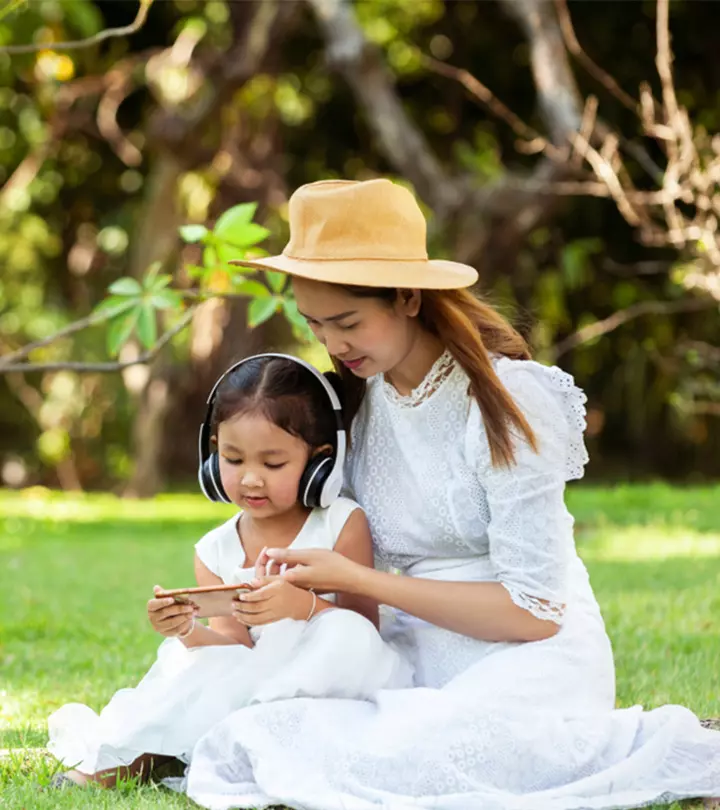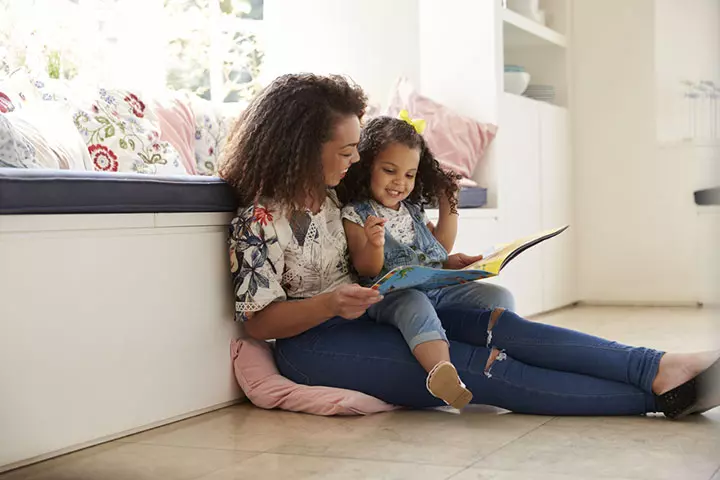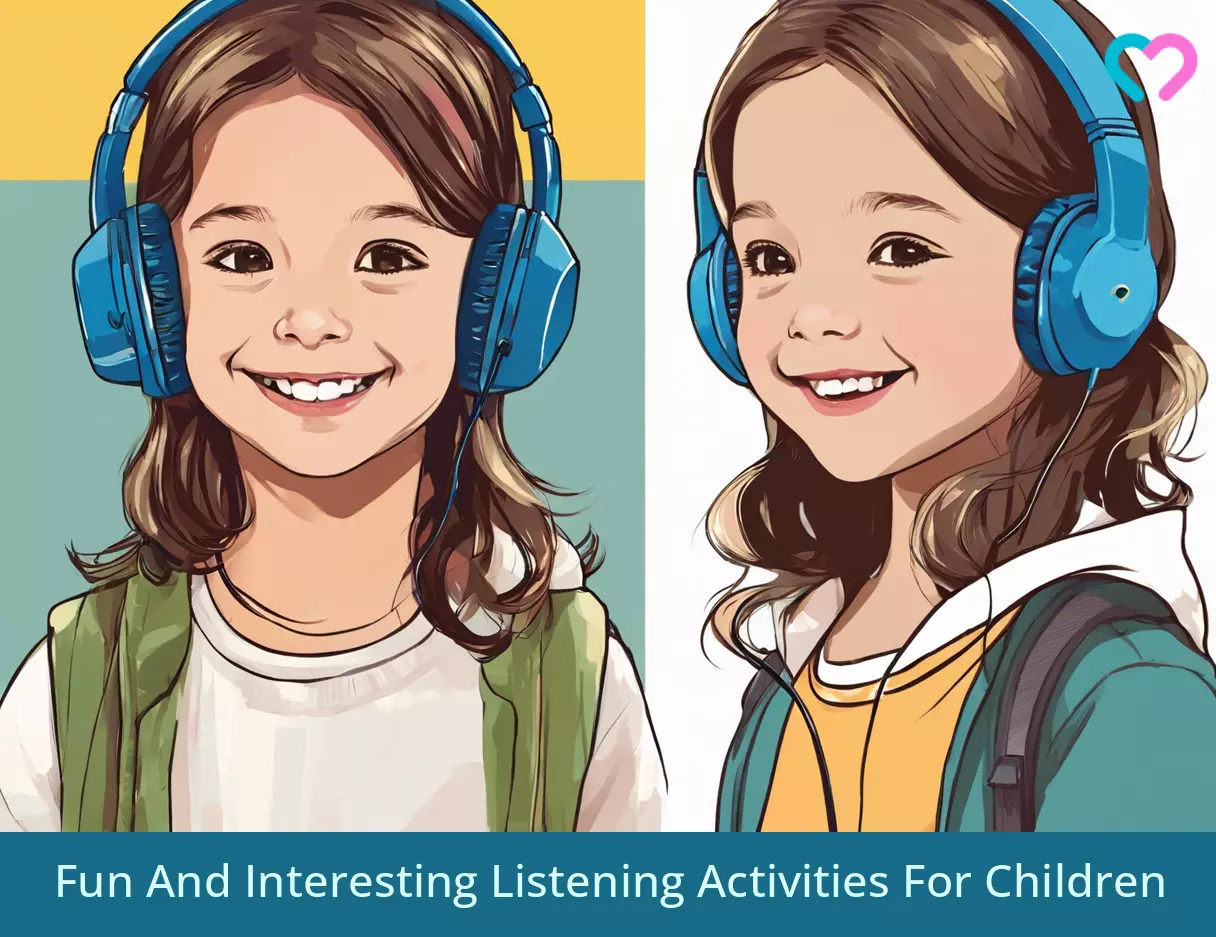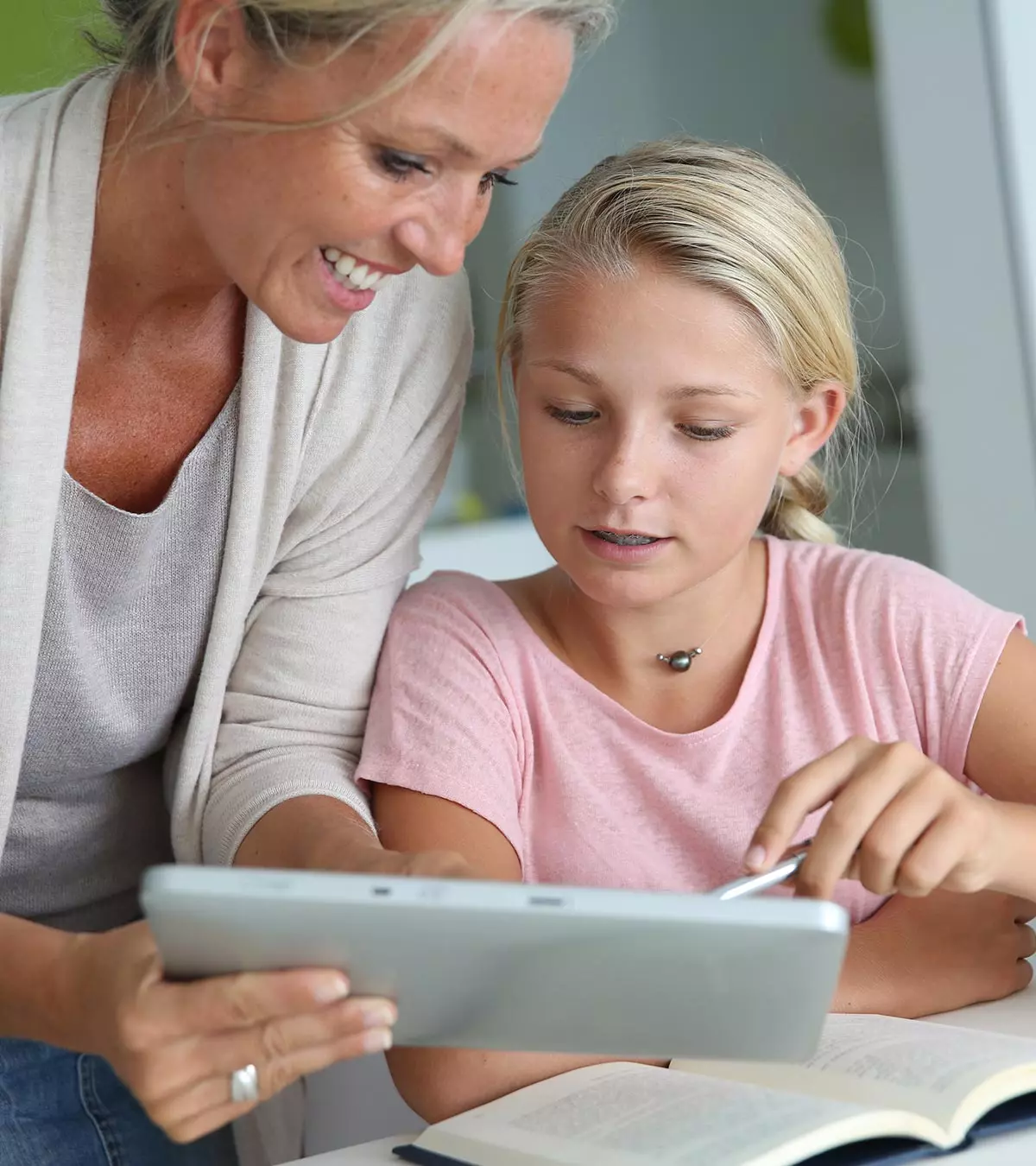
Image: Shutterstock
Introducing listening activities for children can help them develop their abilities to listen and understand. Most parents are worried when children do not listen to them or follow instructions. It may be because they do not like to be in one place to listen to someone. However, developing listening skills in children is important as it allows them to perceive speech and sound in the environment better, develop better communication, and learn social interaction. This post introduces you to several interesting activities that will help children develop their listening skills in a fun way.
Key Pointers
- Listening offers numerous benefits, such as improving literacy and expanding sound recognition.
- Children can be encouraged to listen better by speaking to them at their level, giving clear instructions, and promoting active listening.
- Regular reading sessions, playing musical instruments, and engaging in blindfolded games can aid in enhancing listening skills.
- It is important to acknowledge and praise children when they exhibit attentive listening and follow instructions accurately.
Why Are Listening Skills For Children Vital?

Image: Shutterstock
Good listening skills lay the foundation stones for success in school.
- Listening well to lessons is the first step to conquer spot tests and examinations.
- Listening helps a child to distinguish between the speech sounds and environmental sounds.
- Good listening and hearing skills are important for development of necessary literacy skills.
Innovative Listening Activities For Children To Help Them Develop Listening Skills
Listening skills depend on different factors such as the direction from which the sound is coming, awareness of different rhythmic patterns and intonation of voice. These constitute the basis of expressive language that helps in acquiring literacy.
You can try different educational activities for kids to help them develop the abilities and concepts necessary to sharpen the children’s listening skills.
1. Playing listening sounds is a good way to help your child distinguish between environmental sounds and animal sounds.
2. You can play guessing games with drums, clocks, tins, etc. Ask your child to make the same sounds.
3. Playing with musical instruments is a good way to help your child learn different rhymes. These may help to create an awareness of harmony and melody in children.
 Do remember
Do remember
Image: IStock
4. Play low and high-pitched tones and sounds to help her distinguish between soft and loud sounds, and varying the volume will help her understand the concept of volume as well.
5. Read stories and ask your child for instance to bark like a dog, whenever a dog appears in the story.
6. If you have a toddler, you can read a nursery rhyme that your child knows and leave out a word. Ask him to identify the word. This activity will also help improve focus and attention in addition to listening skills.
7. Play games using blindfolds that will help your child understand the direction from where the sound is coming.
8. Make reading a regular practice. Join your child in this and monitor her progress. Pause to ask questions to make sure your child is listening to the story, and provide feedback on their answers. Repetition can also be helpful in improving listening skills, so consider re-reading favorite books or stories to give your child more opportunities to listen and engage with the content.

Image: Shutterstock
9. Using the media can be an interesting way to improve listening skills. Watching skills and listening to podcasts or the regular shows will not only improve their vocabulary, but the attention spans as well. Children will start familiarizing with unknown words. You can encourage them to write down the words and improve their stock of words.
 Quick tip
Quick tip10. Put two children sitting back to back and show one of them a picture with lots of shapes. Ask her to name the different shapes while the other one writes whatever she hears. You can change the pictures when over and switch roles among the partners.
Interesting Strategies For Developing Listening Skills In Children
You can follow good strategies to help your child develop listening skills. These activities are designed to make the learning sessions fun and interesting for children while promoting engagement and participation.
Here are some options you can try:
- Ask your child to listen when you speak.
- Stoop down to her level and talk to her.

Image: IStock
- You must be clear while giving instructions.
- Be attentive to your child and reduce all distractions around.
- Let him know the things you need him to remember like, “listen to the 2 things I am telling you”, “brush your teeth and comb your teeth”, etc. Make sure to repeat the important words like “brush” and “comb”.
- You must praise or reward your child every time she listens to you and works according to the instructions.

Image: Shutterstock
Frequently Asked Questions
1. What are the three As of active listening in children?
Active listening for kids contains three basic skills — attitude, attention, and adjustment, collectively known as triple-A-listening (1).
2. What are pre-listening and while-listening activities for children?
Pre-listening activities prepare a child for listening to generate interest in the subject. These activities may include related text reading, brainstorming language, study before listening, and listening comprehension tasks (2). While-listening activities are the activities children do when listening; it may include true or false, listen and describe, false facts dictation, multiple-choice, and gap fill.
3. What are some ways to assess my child’s listening skills?
You can assess your child’s listening skills by asking them to repeat what you said. You can also give them comprehension questions or ask them to write a summary. Another way is to have a healthy, non-judgmental discussion.
4. How can I use music to help my child develop listening skills?
You may start singing to children right from a young age. Lullabies and songs teach children about pronunciation and grammar (3).
5. What are some listening activities that can be done outdoors?
A listening walk is one of the best activities outdoors (4). In this activity, children have to walk outside quietly and listen to the various sounds around them. They can come back and discuss the sounds they heard. Other activities include where’s the sound, musical chairs, and red light, green light.
6. How can I incorporate listening activities into everyday routines?
Talking to your child is one of the most basic listening activities. You also need to listen to them so that they follow your example. You can take them to the common play area, where they can listen to different sounds. If you have time, you can take them to the park and zoo to listen to new sounds. At home, you can create noises using utensils or toys and ask them to guess the source of the sound.
7. What are some online resources for listening activities for children?
You can find several online resources for listening activities for children. For example, the British Council has a listening activity section where you can find ways to enhance and assess your child’s listening skills and assess them. Other resources include CBeeBies, ESL Brains, and Elllo.
8. What are some common mistakes parents and teachers make when trying to improve a child’s listening skills?
Shouting at their children or talking loudly is one of the most common mistakes parents and teachers make. Moreover, they often do not listen to what the children are saying. Instead, they talk over them and try to find solutions for their problems. This may give a wrong message to the child.
A child not listening to them is one of the most common complaints many parents have. Listening activities can help children learn how to be good listeners, which is a skill that helps them throughout their lives. They can even learn several things academically as well. Parents should lead by example and practically make their little ones good listeners. Fun listening activities can be a good way to improve communication skills in kids. Additionally, it can also be a useful evaluation and assessment tool for parents to gauge their child’s listening abilities.
Infographic: Fun Activities To Help Children Develop Their Listening Skills
The development of strong listening skills is important for children’s overall communication and learning abilities. The infographic below presents a collection of amazing activities designed to improve children’s listening skills. These activities provide fun and interactive ways to enhance children’s listening skills, attention span, and interpretation abilities. Illustration: Momjunction Design Team
Illustration: Fun And Interesting Listening Activities For Children

Image: Stable Diffusion/MomJunction Design Team
Learn how to engage your children with these fun and interactive active listening games! Perfect for kids aged 3-7, these games will help develop their listening skills.
References
- Triple-A-Listening.
https://www.umfk.edu/offices/student-success/listening/ - Pre-listening activities.
https://www.teachingenglish.org.uk/professional-development/teachers/planning-lessons-and-courses/articles/pre-listening-activities - Building Young Children’s Listening Skills with Music
https://helpmegrowalabama.org/building-young-childrens-listening-skills-with-music/ - Explore Together (outdoors): Outdoor Listening Walk
http://resourcesforearlylearning.org/parents/activity/405/
Community Experiences
Join the conversation and become a part of our nurturing community! Share your stories, experiences, and insights to connect with fellow parents.
Read full bio of Elisa Yi
Read full bio of Harshita Makvana
Read full bio of Deepa Thomas
Read full bio of Kavita Kankani

















